The more we plunge into 2024, the more changes take place in the world music industry under the influence of progress in technologies, changes in preferences among audiences, and not-yet-ended geopolitical and social transformations. All these changes posed in both Russian and global music industries find a reflection; there are adjustments, though, with respect to specific regional and cultural aspects-novel dynamics and challenges. This article sets out the situation in the music industry in 2024, with a peculiar focus on the role of Russia within the global landscape and trends that shape both local and international markets.
- Technological Burgeoning: Supremacy of AI and Streaming Technology in 2024 remains at the forefront of the global music industry. In the creation, marketing, and distribution of music, the uses of Artificial Intelligence are increasingly rampant. AI tools are allowing artists-unprecedented speed and precision-to compose, mix, and master tracks. This has democratized music production, making it possible for a wider range of artists to create and share their work.
In Russia, these tools that produce music with AI have also taken off. However, the rich traditions of both classical and folk in this country still play huge roles in shaping its modern music. Russian artists keep embracing AI to incorporate elements of their cultural heritage into eclectic mixes of traditional and modern.
Music streaming services remain the leading source of music consumption globally. Among these services, Spotify, Apple Music, and YouTube Music stand at the forefront in the West, whereas Yandex Music and VK Music dominate the Russian market. Such services have granted artists from all over the world, including in Russia, an opportunity to rise to popularity in other countries. One can claim that such services are not without their vice-artistically speaking: low royalty rates continue being one of the most critical points of discussion between artists and music streaming services.
- Geopolitical Tensions and Sanctions—the Russian Music Industry Ongoing geopolitical tensions and economic sanctions against Russia, tied to the conflict in Ukraine since 2022, have significantly impacted the country’s music industry. As a result, major international record labels have scaled down their operations in Russia, which initially restricted Russian artists’ access to international markets. However, this shift has also led to the growth of independent music labels and platforms within the country.
In 2024, more Russian artists are turning towards local labels and self-distribution models. Platforms like Bandcamp and Yandex Music have become essential in helping Russian music reach international audiences. Decentralized distribution models have allowed many Russian artists to retain creative control and avoid the limitations imposed by sanctions.
Russian musicians have also found new listeners in non-Western countries, especially through cultural exchanges and collaborations in China, India, and the Middle East. This diversification of the Russian music scene has enabled artists to bypass traditional Western pathways while still achieving international success.
- Cultural Renaissance: A Fusion of Traditional and Contemporary Genres While the global music industry is dominated by genres like pop, hip-hop, and electronic music, Russia has experienced a cultural renaissance in 2024. Traditional Russian folk music, deeply rooted in the country’s history, is enjoying a revival, often blended with modern genres. This trend is part of a broader movement in Russia to preserve and celebrate cultural heritage, even as modernity is embraced.
Artists like Manizha, who gained international acclaim for merging folk with pop and social themes, continue to inspire a new wave of Russian musicians. This mix of traditional and contemporary styles has found resonance both domestically and internationally, offering a unique flavor to a saturated global music market.
Meanwhile, genres like hip-hop, which gained massive popularity in Russia during the 2010s, continue to thrive. Russian rap and electronic music have evolved, often reflecting the country’s social and political landscape. Lyrics have become more introspective, focusing on themes of identity, culture, and resilience in the face of external pressures.
- Social Media and Content Creation: The Power of Short-Form Videos Globally, platforms like TikTok and Instagram have transformed music discovery and consumption. In 2024, short-form video content remains a key tool for music promotion. Viral challenges, dance trends, and meme culture continue to play a crucial role in propelling songs to international success.
In Russia, TikTok and VKontakte (VK) have been particularly influential in shaping the music scene. Russian artists have mastered creating engaging short-form content, often collaborating with influencers to boost their visibility. The accessibility of these platforms has enabled emerging artists to quickly build dedicated fanbases.
However, the rise of social media-driven music trends has raised concerns about artistic authenticity. Some critics argue that artists are increasingly focusing on viral success over musical innovation, while others see social media as a platform that gives visibility to artists who might otherwise go unnoticed.
- Live Music and Festivals: A Post-Pandemic Rebound After years of pandemic restrictions, live music and festivals have made a strong comeback in 2024. Globally, festivals like Coachella, Glastonbury, and Tomorrowland have returned to their pre-pandemic grandeur, drawing large crowds. Similarly, Russia’s festival scene has rebounded, with popular events like Nashestvie and Afisha Picnic once again attracting significant audiences.
However, the landscape has changed. Health and safety protocols remain in place, and many events now integrate virtual elements, allowing fans worldwide to join remotely. This hybrid model has been effective in Russia, where many fans still prefer to enjoy live music from the comfort of their homes due to ongoing concerns about large gatherings.
Additionally, Russian artists have embraced smaller, more intimate concerts, particularly in urban centers like Moscow and St. Petersburg. These events offer a more personal experience, allowing artists to connect deeply with their audience.
- The Future: Sustainability and New Business Models Looking ahead, sustainability has become a major concern for both the Russian and global music industries. The environmental impact of large festivals, tours, and music production has sparked calls for greener practices. In 2024, many artists and event organizers are adopting eco-friendly initiatives, such as reducing carbon footprints, promoting sustainable merchandise, and using renewable energy at events.
New business models are also emerging, with blockchain technology playing an increasing role in the music industry. NFTs (non-fungible tokens) have become a way for artists to sell unique digital assets and create new revenue streams. While this trend has gained traction globally, Russian artists are also exploring the potential of NFTs, especially as a means to maintain financial independence in an industry that increasingly relies on streaming.
Here are some graphs that illustrate the main trends in the music industry market in Russia and the CIS:
- The growth chart of the digital music market shows that stable growth is expected at about 3.8% per year from 2024 to 2027.
- Revenue from streaming services is showing steady growth, increasing from $800 million to $960 million over this period.
- Revenue from live performances is also growing, starting at $500 million in 2024 and reaching $670 million by 2027.
This data highlights the promise of your production center, especially given the growing demand for digital and live music services.
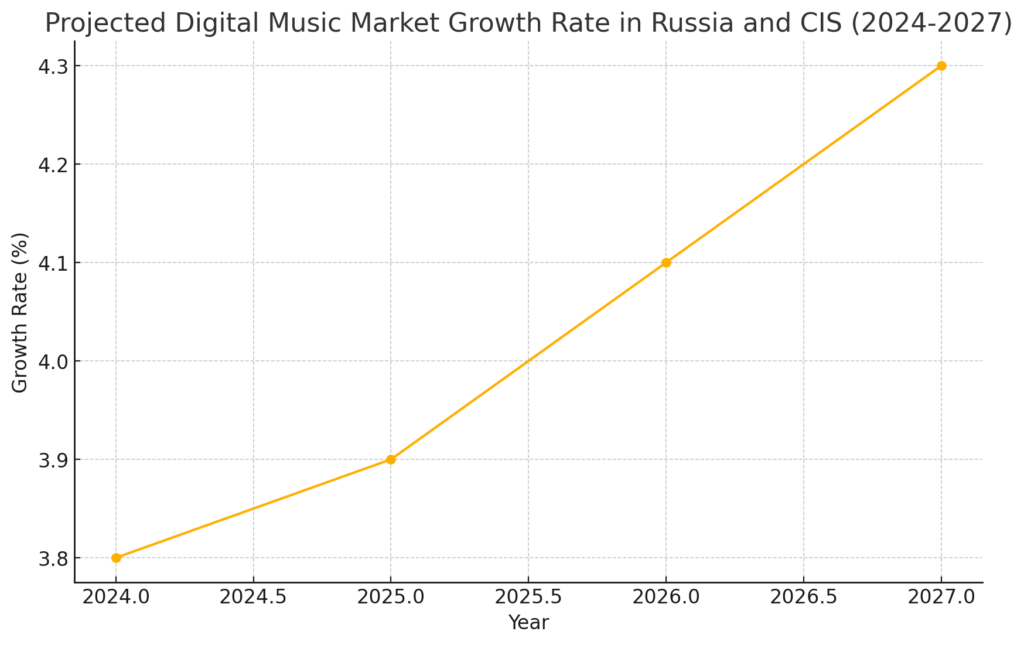


Here are additional infographics to help you better understand the music industry market:
- The chart of the streaming platform market share shows that Spotify (35%) and Yandex.Music (25%) are the leaders in Russia and the CIS, followed by Apple Music and VK Music with a share of 15% each.
- The graph of the growth in the number of users of streaming services shows that the number of users will grow from 30 million in 2024 to 43 million in 2027.
This data highlights the importance of working with leading platforms and the potential to attract new users in the future.
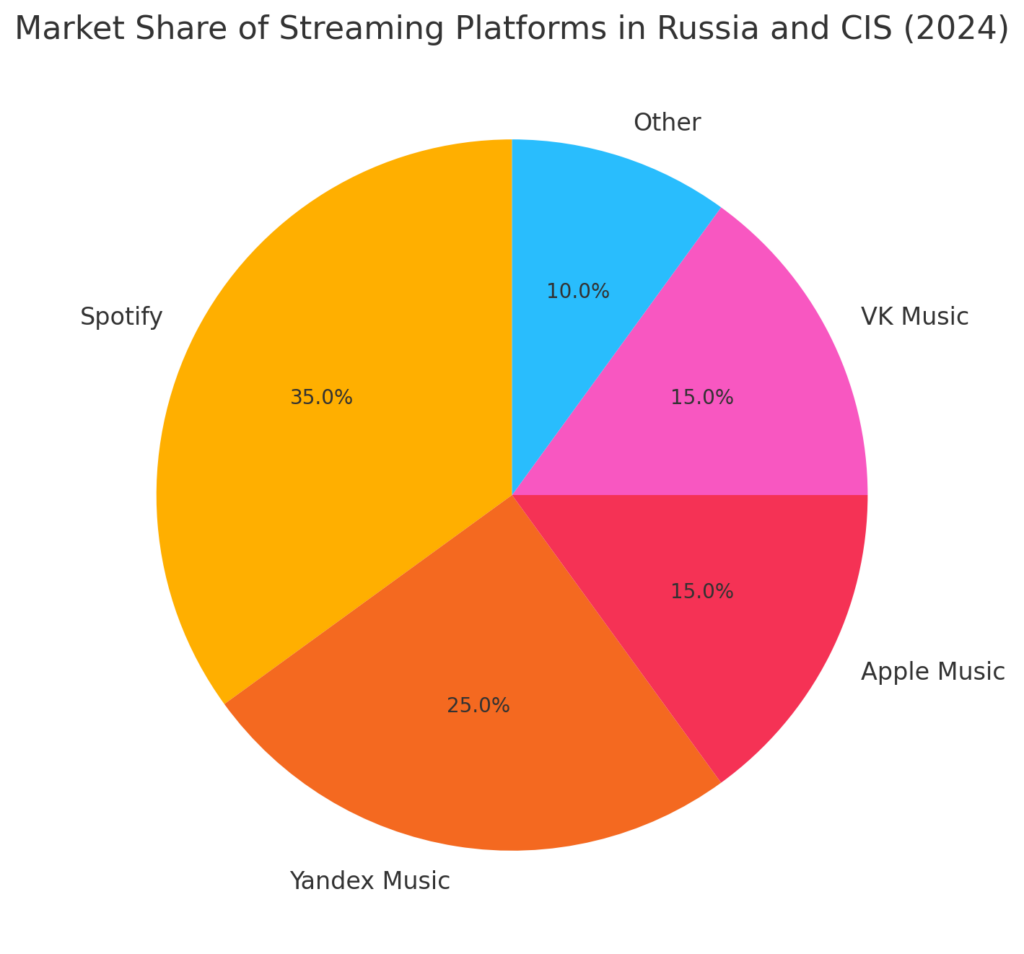
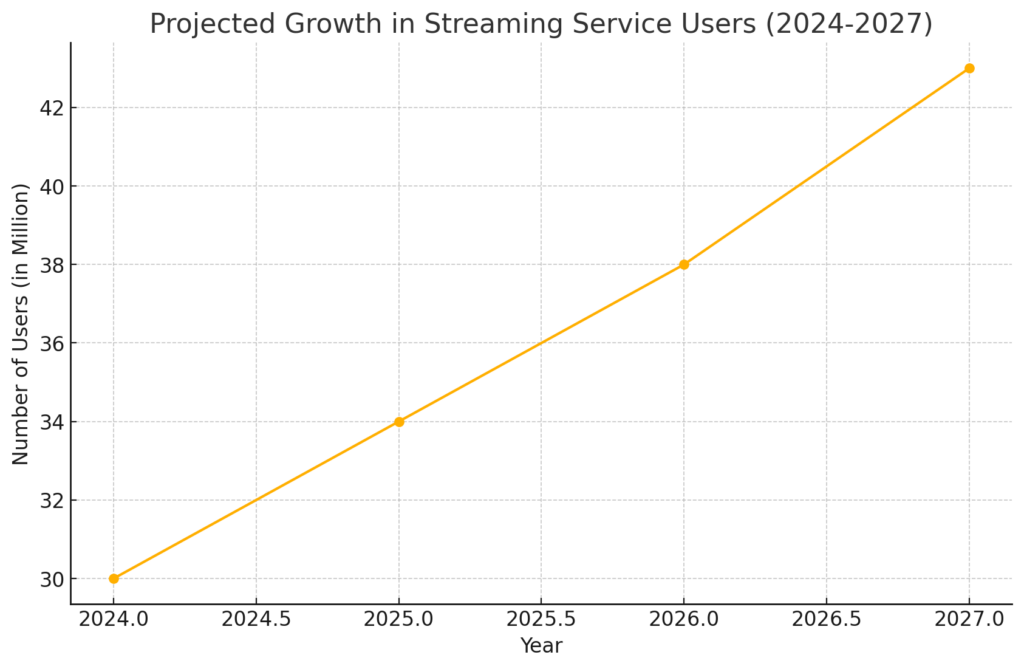
Here are some more infographics for a more detailed analysis of the music industry market:
- Distribution of income by source in 2024: The main income comes from streaming services and live concerts, which underlines the importance of digital and live interaction with the audience.
- Revenue distribution in 2027: It can be seen that revenue from streaming and live performances continues to grow, while physical sales are declining.
- Comparison of income growth by source (2024-2027): Here you can see the dynamics of income growth for each source. For example, there has been significant growth in streaming services and the organization of live events, which indicates a growing demand for digital content and concerts.
These graphs will help you better understand the distribution and dynamics of income so that you can more accurately plan the development of your production center
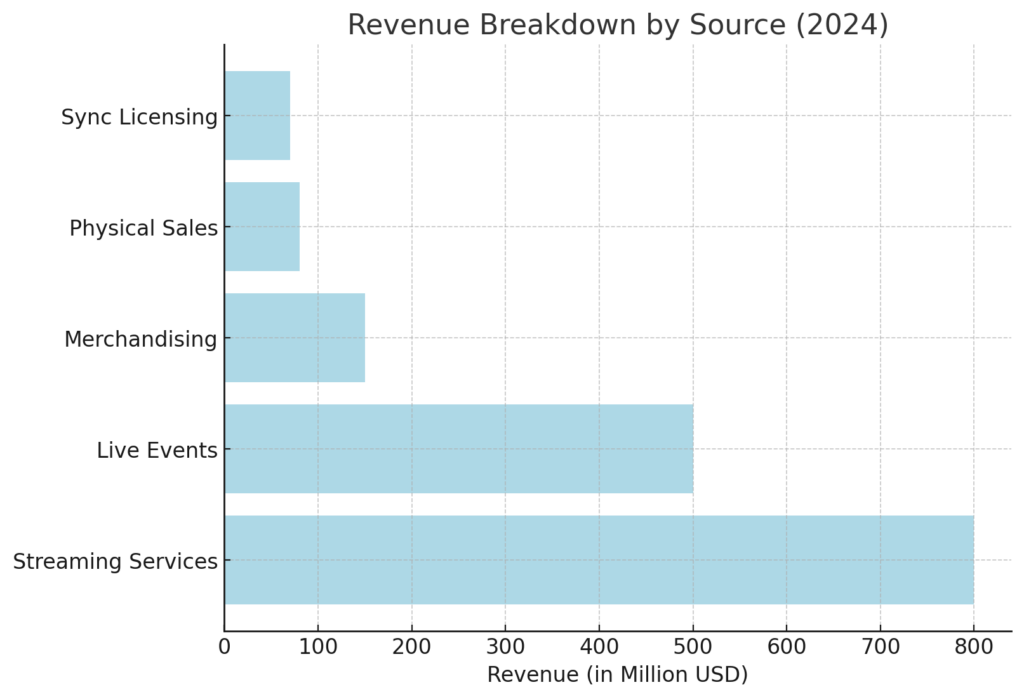
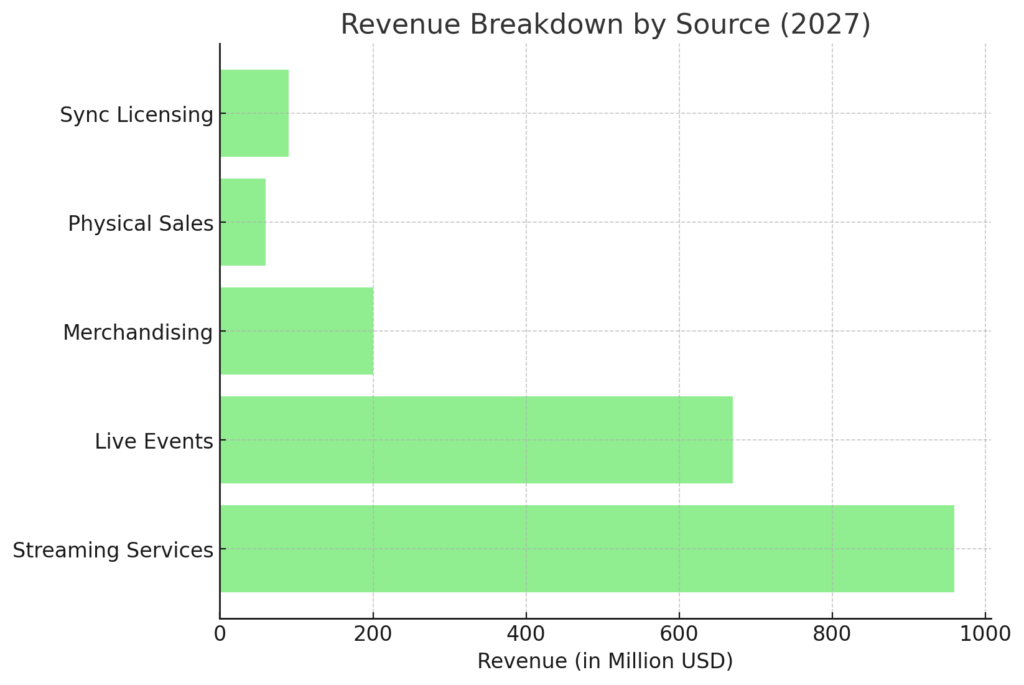
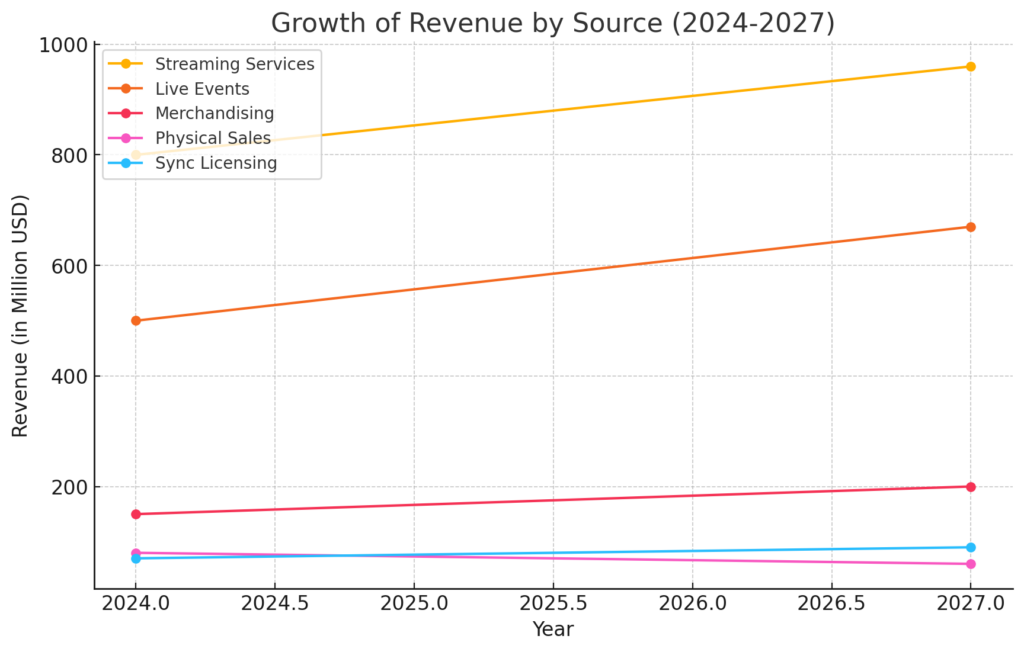
Conclusion
In 2024, the Russian and global music industries are navigating a complex and evolving landscape.
Technology continues to transform how music is created, distributed, and consumed, while geopolitical tensions and cultural shifts have introduced new challenges and opportunities. Despite these disruptions, the music industry remains a vibrant and dynamic space, where creativity thrives and new voices continue to emerge. As Russia finds new routes to global recognition and the world embraces innovative technologies and platforms, the future of music appears more diverse and interconnected than ever.
by Alexei Olin | Managing partner @ iVenturer Foundation
